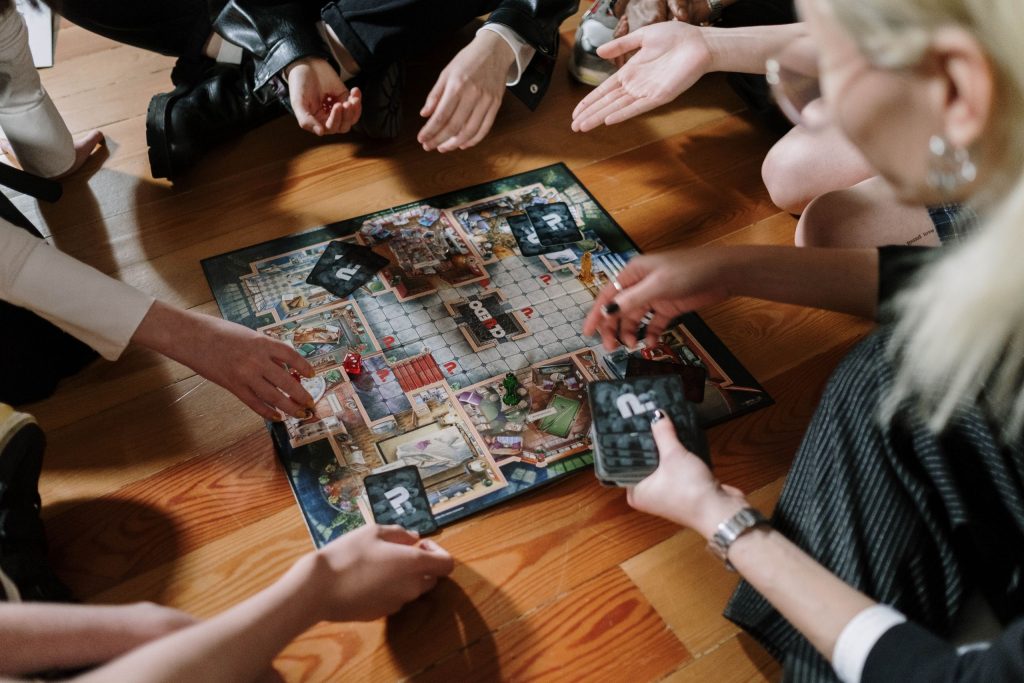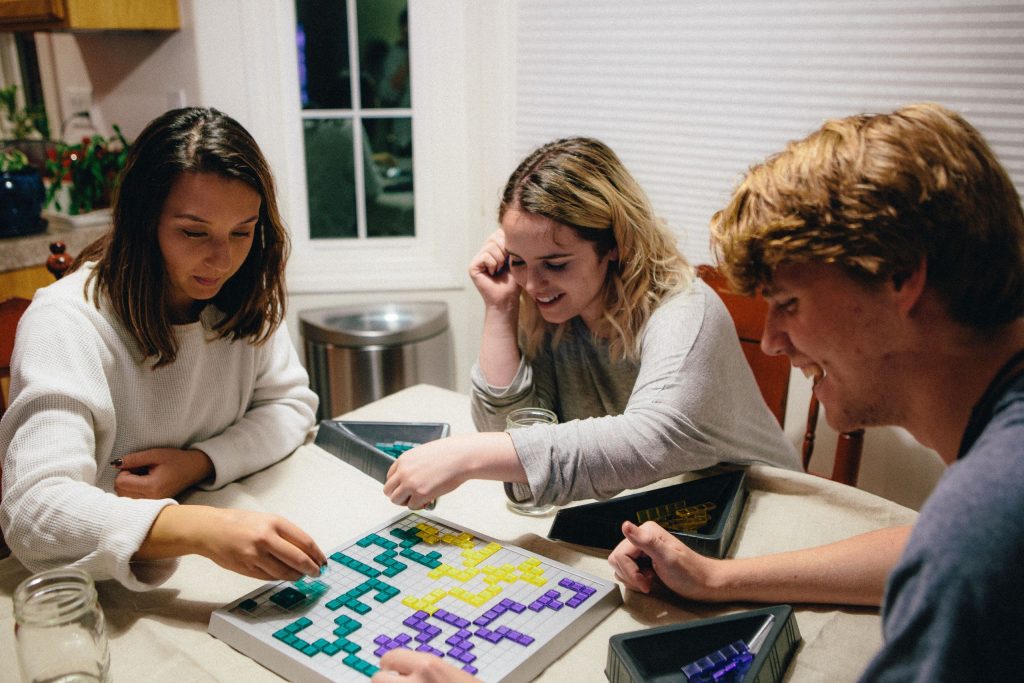Cooperative board games are changing the game scene and altering the emphasis from rivalry to cooperation. These games bring people together as they pursue a shared objective, therefore improving collaboration and accomplishment as connection becomes even more vital in our society. Families, casual players, and committed board game aficionados all find this paradigm change intriguing and hence inspire involvement. Games include “Pandemic,” “Gloomhaven,” and “Spirit Island not only foster social connection but also function as a mirror reflecting more general cultural trends favoring inclusion and collaboration over uniqueness.” As they overcome challenges together, players improve their relationships by honing crucial communication and problem-solving skills, therefore strengthening their connections and allowing them to enjoy rich storylines and amazing mechanics. Analyzing the development of cooperative games in modern gaming society, this study stresses their cultural importance, appeal, and continuous impact on human relationship via play.
The Appeal of Working Together
Cooperative board games provide a special place where players get together to confront issues as a unified front instead of rival one other. Strong relationships and deepening friendships might result from this kind of camaraderie developed by this effort. Instead of under pressure to outperform one another, players might focus on working together, sharing ideas, and planning jointly. Success and failure become communal events where everyone contributes to create fun, inventiveness, and sometimes even shocking stories like the famous cat perched on the toilet at Flash Point!
These games especially provide entertainment as they let one turn defeats into happy memories. When the stakes are high and the odds seem stacked against you, working together might turn a maybe embarrassing loss into a humorous and memorable narrative. The voyage itself frequently brings delight for players as it celebrates the little victories and helps them to accept the losses together. Thus, whether you are rescuing victims from a fire or fighting zombies, the cooperative experience of playing changes the game into a bonding activity that may leave you with memories to tell and laughs to share long after the game is ended.

The Evolution of Cooperative Game Design
Early cooperative games were somewhat simple and focused on people cooperating to reach a shared objective. Imagine classics like Pandemic or Forbidden Island, where everyone could play and the mechanics were straightforward. These games highlight teamwork and communication in a laid-back, low-stress setting, therefore establishing the basis for a genre that would change over years.
By now cooperative gaming has evolved significantly. Modern novels like Spirit Island and Gloomhaven combine great story with cutting-edge technologies. Every session nowadays is different as gamers are immersed in intricate narrative and different gameplay strategies. From amateur to expert levels, these games captivate a wide range of players with themes ranging from discovering dungeons to battling nature spirits. Together, cooperation, challenge, and captivating stories provide an experience that not only raises entertainment value but also allows gamers feel more a part of their community.
Broadening Gaming Audiences
Families, casual players, and those who may turn away from conventional competitiveness will find cooperative games ideal. Players team to tackle obstacles together instead of fighting against one other, therefore fostering a more laid-back and fun environment. This group method lessens the stress so that everyone may participate without concern to losing. Whether your Letter Jam is encountering challenges or you are working together to rescue the planet in Pandemic, the emphasis moves to cooperation and communication, thereby improving the inclusive and enjoyable nature of the game for everybody.
Cooperative games have appeal because they allow people to gather. Families may connect over common tactics, friends can laugh at their failures, and even those just starting out in gaming can find acceptance. It promotes camaraderie as everyone strives for a shared objective and no one winner exists. Celebrating their team successes, athletes create lasting memories and bonds. Therefore, cooperative games are a terrific choice if you want a game everyone can enjoy free from the competitive stress!
Real-Life Skills Through Gameplay
One of the most fascinating features of cooperative board games are how they automatically improve real-life abilities. Players always go beyond challenges when they handle them together. Everyone promotes critical thinking and teamwork whether one is choosing the best line of action, organizing their next action, or assigning chores. This useful approach not only makes fun but also helps one become confident about their ability for decision-making.
Furthermore, the experience starts to depend much on communication. To reach their shared objective, players have to exchange ideas, pay attention to one another, and provide comments. This engagement motivates players to communicate themselves well and grasp several points of view, therefore strengthening their interpersonal skills. Motivated in a fun gaming environment, people may acquire these abilities that will enable them to use them in their everyday life.
Cooperative board games are ultimately more than simply entertainment; they provide the ideal forum for learning important life skills and still allow valuable time with loved ones. Beyond the game night, all the fun and cooperation around the table may create lasting memories that enhance real-world relationships and teamwork.
The Social Impact of Collaborative Gaming
In today’s fast-paced digital world, it might be hard to keep real connections going. Cooperative board games like Pandemic and Letter Jam bring people together by focusing on projects and group work. These games encourage both community and variety, and they help players work together to solve problems. Instead of fighting against one another, players gather for a same goal, therefore rendering every victory as a shared success. In both social situations and businesses, this kind of friendship is very vital as strong ties might result in improved coordination and communication.
Together, two games—Letter Jam and Pandemic—allow players to have fun while developing important skills by removing viruses from Pandemic or coding words. They encourage honesty and innovation so team members may share ideas and help one other. Cooperative play gives everyone an opportunity to participate, therefore enhancing their worth to one another. Board games provide a novel approach to bond, laugh, and build lifelong memories together at a time when internet contacts often replace in-person encounters. So get your colleagues or friends and start a cooperative gaming experience that builds your team and real relationships!

Final Thought
Cooperative board games have changed the gaming business by making activities that bring people together more important than fierce competition. These get-togethers are aimed to get friends and relatives cooperating toward common objectives. This will provide a better environment for development of friendship, creativity, and leisure time. Together, players who overcome challenges not only strengthen their bonds but also engage in immersive narrative wherein their choices influence the outcome of the game. Emphasizing the pleasure of shared experiences over personal achievements, this new wave of gaming innovation encourages players to embrace the satisfaction of collaboration and examine the broad spectrum of cooperative and story-driven games currently available.











